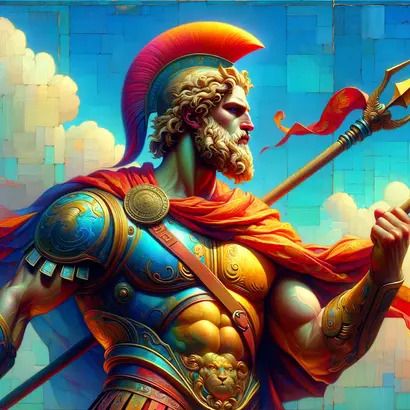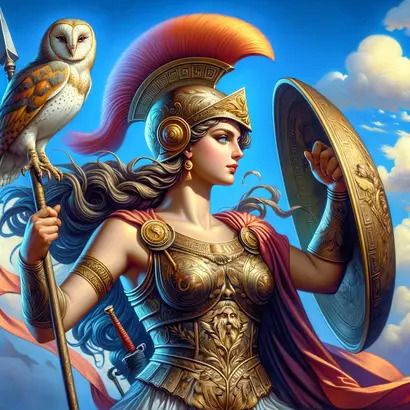
Ares
⚔ Ares :: Greek War God
Ares is the Olympian god of war. However, unlike Athena, he represents merely its destructive capacity and is typically the personification of sheer violence and brutality. Consequently, he was loved neither by gods nor by men. That is, with the exception of Aphrodite, who bore him many children out of wedlock.
Ares’ Role
Greek War God
Quite appropriately, Ares’ name seems to have been an ancient word for battle or war.
Ares' Portrayal and Symbolism
In art, Ares is usually represented wearing a helmet, a shield and either a sword or a spear. He drives a four-horse chariot and is accompanied by dogs or vultures. Sometimes, his sons Deimos and Phobos are also depicted beside him.
Ares' Epithets
Unlike his nobler Roman counterpart Mars, Ares was an unpopular god and never developed beyond the image of a divine battle-frenzy butcher. Consequently, only a few epithets have reached us. Unsurprisingly, few of them are flattering: “the bane of mortals,” “the slayer of men,” “the city-stormer,” “the armor-clattering,” “the arm-bearing.”
Ares' Family
Ares was the oldest child of Zeus and Hera, and, according to those who think that Hephaestus was born through parthenogenesis, their only son. Either way, he certainly had two sisters: Eileithyia, the goddess of childbirth, and Hebe, the goddess of eternal youth.
Ares, the Unloved God
Battle with Diomedes
Since he was the savage god of senseless war, Ares was almost universally detested. At one point, after Ares is wounded in battle by Diomedes, even Zeus calls him “the most hateful of all the gods,” remarking that if he hadn’t been his son, he would have surely ended up in Tartarus with Cronus and the Titans.
Trojan War
The episode with Diomedes is only one of many in which Ares comes off second-best in his martial encounters. During the Trojan War, Athena needs no more than one stone to floor him, after which she spends some time mocking him and bragging of her superiority as a warrior.
Ares Defeats
Heracles defeats Ares not once, but twice – first during the battle of Pylos, and then after killing his son Cycnus. Most humiliatingly, Otus and Ephialtes, the Aloadae, once manage to kidnap Ares and imprison him in a bronze jar for thirteen months. Homer says that if their stepmother Eriboea hadn’t told Hermes about it, this would have spelled the end of Ares.
Ares and Aphrodite
Ares had many women, but none of his affairs was as famous as the one he had with Aphrodite. At the time, the goddess of beauty was married to Ares’ brother, Hephaestus, who was told by Helios of his wife’s transgressions. Hephaestus fashioned a delicate, almost invisible, bronze net, which he put on the bed where Ares and Aphrodite were supposed to lie. When they finally did in his absence, he stormed into the room with a host of gods. The Olympians laughed for days at the helplessly entrapped lovers.
However, it seems that in this case, Ares had the last laugh, since Aphrodite bore him at least three and as many as eight children. Hesiod lists only Deimos, Phobos, and Harmonia. Later authors include Adrestia and some or all of the four Erotes: Eros, Anteros, Pothos, and Himeros.
Ares’ Companions and Other Children
Ares War Companions
Ares can rarely be seen alone on the battlefield. He is typically joined by a bloodthirsty crowd, a number of infernal associates symbolizing the terror of war. His sons Deimos (Panic or Dread) and Phobos (Fear) are almost always beside him. The same holds true for Ares’ “comrade and sister” Eris (Strife) and Enyo (the Sacker of Cities and “sister of war”). Sometimes, Kydoimos appears as well – the personification of the confusion and muddle of battle. Most frighteningly, so do the Keres, the grim-eyed female Spirits of Death, dressed in cloaks crimson with human blood.
Ares and Greek Heroes
Ares was associated with many bellicose heroes in Greek mythology, such as the aforementioned Cycnus or Diomedes of Thrace, whose man-eating mares Heracles was supposed to capture as his eight labor. Probably with his daughter Harmonia, Ares fathered a whole race of warriors: the Amazons. Otrera gave him the most famous four: Hippolyta, Antiope, Melanippe, and Penthesilea.
In recent times, Ares' name is used by a number of sports teams like the Greek Football Team Aris Salonika.
Ares: Myths and Hidden Truths
It is a common misconception that Ares is a universally hated god. While it is true that he is not as beloved as some other Olympian gods, there were communities in ancient Greece, such as the Spartans, who held Ares in high regard, as they saw him as the embodiment of courage, valor, and military strategy.
Another misconception is that Ares is a god of war and destruction without any redeeming qualities. However, it is essential to note that Ares was also associated with the idea of "taming" chaos through strict discipline and unwavering courage. He was believed to possess a clear sense of duty and honor, particularly when it came to protecting his children and allies.
Ares and the city of Thebes
Ares fathered a daughter, Harmonia, with the goddess Aphrodite. This union resulted in the creation of a sacred necklace, which was given to Harmonia as a wedding gift when she married the Theban king Cadmus. The necklace would go on to play a significant role in the city's history, and the mythological narrative of Thebes would continue to intertwine with Ares and his lineage.
Ares and Areopagus
Another interesting tidbit about Ares is his connection to the Areopagus, an important council and court in ancient Athens. The Areopagus, translating to "Ares' Hill," was named after the god, as it was believed to be the site where he was tried for the murder of Poseidon's son, Halirrhothius. According to the myth, Ares killed Halirrhothius for attempting to violate his daughter, Alcippe. In a groundbreaking trial, the gods acquitted Ares, marking the establishment of the Areopagus as a place of justice.
Unraveling Ares: War, Passion, and Mythology
Throughout our exploration of Ares, the Olympian god of war, we have been captivated by the depths of his raw power and intensity. We've experienced a mix of emotions, from being awed by the sheer force he represents to feeling empathy for the unloved god. In our research, we were particularly struck by the passionate love story between Ares and Aphrodite, which provided a fascinating contrast to the violent aspects of his character.
As we delved into the rich tapestry of mythology, we couldn't help but feel a profound sense of wonder and amazement at how these ancient stories continue to resonate with us today. Indeed, Ares serves as a potent reminder of the duality inherent in life, and we hope that our exploration of his story has provided you with new insights and reflections as well.
Ares Sources
“The Homeric Hymn to Ares” contains some of the very few flattering verses directed at Ares. A large part of the fifth book of the “Iliad” revolves around him and Athena. You can read all about Ares and Aphrodite’s affair and Hephaestus’ subsequent revenge in the eighth book of the “Odyssey.”
See Also: Aphrodite, Zeus, Athena, Eros
Ares Video
Ares Q&A
Link/Cite Ares Page
Written by: The Editors of GreekMythology.com. GreekMythology.com editors write, review and revise subject areas in which they have extensive knowledge based on their working experience or advanced studies.
For MLA style citation use: GreekMythology.com, The Editors of Website. "Ares". GreekMythology.com Website, 19 Apr. 2023, https://www.greekmythology.com/Olympians/Aris/aris.html. Accessed 25 April 2024.




